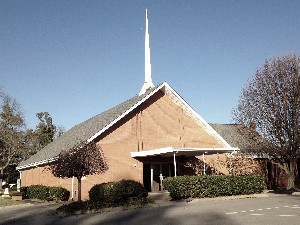by Hugh Fulford
From the very beginning of the effort to restore original New Testament Christianity, churches of Christ have stood opposed to the use of mechanical instruments of music in worship. This is the case because the churches of Christ in New Testament times did not use instrumental music in their worship. There is no passage in the New Testament that authorizes the use of instruments in worship, and there is no example of instrumental music being used by the early congregations. The music of the church for the first several centuries after its establishment was strictly a cappella (vocal only). (See Ephesians 5:19; Colossians 3:16; Hebrews 13:15; et al).
It is generally recognized that Pope Vitalian (657-672) was the first to introduce the use of instrumental music in worship in about 670. However, many church historians now think that it was not until the tenth century that instrumental music began to be used. Either date puts it well this side of the New Testament.
When the Protestant Reformation was launched, several of the reformers opposed the use of instruments in worship. When the Presbyterian, Methodist, and Baptist denominations began, they all opposed the use of instrumental music in worship, and did so for several years after their beginning. (For example, Charles H. Spurgeon, arguably the greatest Baptist preacher to ever live, and who preached to thousands every Sunday at the Metropolitan Baptist Tabernacle in London for thirty-eight years, never permitted a mechanical instrument to be used in his services.) We see therefore that churches of Christ have not always been alone in their opposition to instrumental music in worship!
Thus, it comes as a shock to read of some churches of Christ beginning to adopt the use of instrumental music in some of their worship assemblies. The elders of these churches, in collaboration with their minister (and often at his instigation), have allegedly “re-studied” the issue and have decided that instrumental music is permissible. It is interesting to note that so far, to the best of my knowledge, no congregation that has “re-studied” the matter has reached the conclusion that the congregation had been right all along in not using the instrument! Rather, because of a clamor from the younger members to adopt the instrument and because of the delusion that its adoption would enable them to hold on to their young people and reach others, the conclusion of the “re-study” seems to have been reached before the re-study was ever done! The decision had already been made before the “re-study” was ever done: “We plan to begin using the instrument in some of our worship assemblies.” How is that for intellectual honesty?
The study and re-study of Bible subjects is always in order. We are to “study to show [ourselves] approved unto God” (2 Ti. 2:15, KJV). The word “study” in this context does not refer so much to reading, analyzing, and determining the meaning of a text, as it means to give thought to, to be diligent, and to make an earnest effort to be approved of God (see NKJV, ASV, NASB, et al). However, no one can be approved of God who does not study God’s word and does not come to an understanding of His will. Like the Bereans, we are to search/examine the Scriptures daily to determine the things that are so (Ac. 17:11), because not everything taught, believed, and practiced in the realm of religion is “so” (cf. 1 Th. 5:21; 1 Jn. 4:1). We are to “not be unwise, but understand what the will of the Lord is” (Ep. 5:17). We are to be ready always to give an answer/defense to everyone who asks us for a reason for the hope within us (I Pe. 3:15). In other words, we are to know (based on the Scriptures) WHAT we believe and WHY we believe it!
But God’s word does not change and truth does not change. The New Testament still says what it has always said about worship that is acceptable to God (Jn. 4:24; 17:17; Ac. 2:42; 20:7; Ep. 5:19; 1 Co. 16:1-2). It needs to be duly noted that not all worship is pleasing and acceptable to God. There is such a thing as “vain worship” (Mt. 15:8-9), “ignorant worship” (Ac. 17:23), and “will worship” (Co. 2:23[KJV, ASV]). Those who have “re-studied” the question of instrumental music in worship have not produced a passage from the New Testament that authorizes the instrument in the worship of the church. They have not produced an example from the New Testament of any congregation in apostolic times that used instrumental music in its worship.
Along with a re-study of the matter of the kind of music that is acceptable to God in the Christian age, I would urge elders, preachers, and all members of the body of Christ to re-study what the Bible says about the necessity of having Bible authority for all that we do in religion. I would urge them to re-study how the Scriptures authorize a thing as being pleasing and acceptable to God. The authority in religion is not what I like or do not like, what I agree with or do not agree with, what I see or do not see anything wrong with, what my parents or grandparents believed about a matter, what “my church” has always taught about a matter, or what some creed, catechism, or church manual says about a matter.
Re-studied the matter? Indeed, I hope so . . . not just the matter of what is pleasing to God in worship, but what the Scriptures teach on a whole host of subjects. One just might discover that the Bible does not teach what one has always been told or what one has always believed or what one has always thought or how one has always “felt” about any number of matters.


